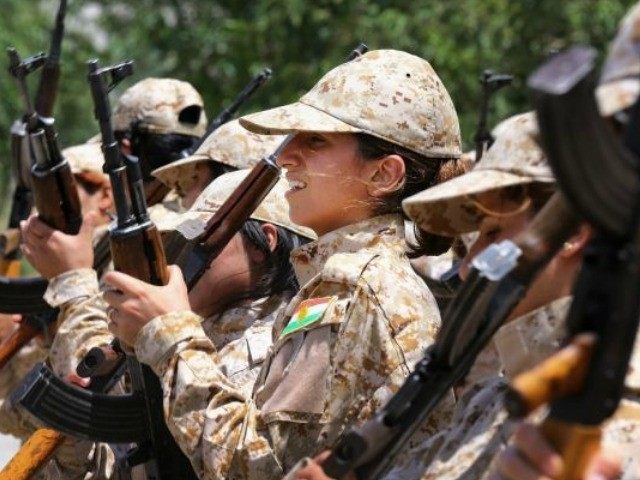A Kurdish man from the beleaguered Syrian border town of Kobani set himself on fire upon learning that his daughter had left home to join the Kurdish People’s Protection Units, the all-female YPJ, in the war against the Islamic State (ISIS/ISIL).
Kurdish news outlet Rudaw identifies the man as 45-year-old Faisal Mustaffa Hecano of Kobani, a town on the border with Turkey that was temporarily occupied by the Islamic State earlier in the year. To protest his daughter’s risking her life by leaving to join the YPJ, the female counterpart to the male YPG Kurdish militia, the man self-immolated in front of the Kurdish government Democratic Autonomous Administration building in Kobani. He has been hospitalized in Turkey and expected to recover.
Rudaw notes this is the second such incident of a parent setting himself on fire to protest the departure of his child for war, though the first occurred months ago, on July 1. The man involved in that incident was protesting that his 15-year-old son had been taken to military training with the Kurdistan Workers’ Party (PKK), a U.S.-designated terrorist group with close ties to the Syrian Kurdish militias and the Democratic Union Party (PYD), the Syrian Kurdish government.
The Kobani incident this week appears to be an outlier in a set of stories in which Kurdish parents celebrate their children’s decision to join the fight against the Islamic State. Women fighters, in particular, express pride and fulfillment in seeing their daughters follow in their footsteps, even those killed in battle. “I’m glad my daughter died for a cause,” Nasreen Hamlawa, a YPJ fighter, told the Daily Beast’s Susannah George in December of her daughter, Rangin, who died fighting ISIS. YPJ fighters, George noted, have been extremely effective against the Islamic State because jihadists believe they can be denied their rewards for committing to jihad in the afterlife if killed at the hands of a woman. This fear of being denied proper martyrdom makes them far more risk-averse on the battlefield when confronting an all-female army.
Female Kurdish fighters are given the same honors are their male counterparts when killed in action, and their female relatives make up a significant contingent of those marching to praise them.
Mothers are not the only ones proud of their daughters going to war. In a particularly stunning story, one father found his daughter in Kobani after he chose to take up arms and follow in her footsteps. Farouk Kobane found his 19-year-old daughter on a street corner in their town after choosing to fight the Islamic State in December. Pervin Kobani had already chosen to join the YPJ. “Honestly when I heard my father is fighting on the western front with the YPG I was so proud of him, and it made me want to fight more,” Pervin said of hearing the news, adding that seeing him fight in person made an even greater impact.
Kurdish forces were ultimately successful at eradicating the Islamic State from Kobani, denying them a key point of entry into Syria from Turkey and making it more difficult for foreign jihadists to join their ranks. The Kurdish fighters on the ground were aided by American airstrikes in ultimately erasing ISIS’s presence in the town in late January.
Kurds in the region are not yet safe, however, as a mission to help rebuild Kobani proved in July; 32 people were killed and 100 injured after a suicide bomber attacked a group of Kurds in Suruç, Turkey, across the border from Kobani. They were preparing to travel to the town and help reconstruction efforts. The Turkish government responded to the bombing by commencing an airstrike campaign against ISIS and the PKK in Syria and Turkey.
Seyh Abdurrahman Alagoz, the suicide bomber responsible for the attack, was the brother of the owner of a tea house called “Islam.” He was found to have been an active ISIS recruiting center. Yunus Emre Alagoz would later go on to perpetrate an attack at a Kurdish peace rally in Ankara, the deadliest attack in post-Ottoman Turkish history.

COMMENTS
Please let us know if you're having issues with commenting.